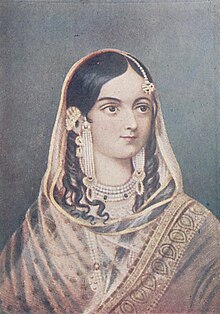Ghaseti Begum
| Ghaseti Begum | |||||
|---|---|---|---|---|---|
 Portrait of Ghaseti Begum, from the book Banglar Begum. | |||||
| Spouse | Nawazish Muhammad Khan | ||||
| |||||
| Father | Alivardi Khan | ||||
Mehar un-Nisa Begum (Persian: مهر النساء بیگم), better known as Ghaseti Begum (Bengali: ঘসেটি বেগম, romanized: Ghôśeṭi Begôm), was the eldest daughter of Alivardi Khan, Nawab of Bengal, Bihar and Orissa during 1740–1756.[1]
Early life
Ghaseti Begum was the eldest daughter of Nawab Alivardi Khan, the Nawab of Bengal, and Princess Sharfunnisa, the paternal aunt of Mir Jafar. Her paternal grandfather was Mirza Muhammad Madani, who was of either Arab or Turkic descent, the son of a foster-brother of the Mughal emperor Aurangzeb.[2][3] Her paternal grandmother belonged to the Turkic Afshar tribe of Khorasan. Through her, she was a relative of Shuja-ud-Din Muhammad Khan, the two having shared a common ancestor in Nawab Aqil Khan.[2][4]
Ghaseti Begum married her paternal cousin, Nawazish Muhammad Khan, who was the Naib Nazim of Dhaka.[1] Being childless, the couple adopted Ikram ud-Daulah, the son of her younger sister Amina Begum. But Ikram ud-Daulah died of smallpox at a young age.[1] Soon after Nawazish Muhammad also died from grief.[1] Ghaseti Begum inherited vast wealth from her husband.[citation needed]
Conspiracy against Siraj ud-Daulah
After the death of Nawab Alivardi Khan, Ghaseti Begum tried to enthrone Shaukat Jang, the son of her second sister Maimuna Begum.[1] But Siraj ud-Daulah managed to ascend to the power of Bengal. Eventually she secretly conspired against him with the help of Mir Jafar, the chief of Alivardi Khan's army, along with the merchants Omichund and Jagat Seth.[citation needed]
Death

After the fall of Siraj ud-Daulah in the Battle of Plassey in 1757, Ghaseti was imprisoned in the Jinjira Palace by Mir Jafar. But sensing danger, Miran, son of Mir Jafar, moved Ghaseti to Murshidabad in 1760.[5] She was believed to have been drowned in the Buriganga River on the way by order of Miran.[6]
See also
References
- ^ a b c d e Iqbal, Shahriyar ZR (2012). "Ghaseti Begum". In Sirajul Islam; Miah, Sajahan; Khanam, Mahfuza; Ahmed, Sabbir (eds.). Banglapedia: the National Encyclopedia of Bangladesh (Online ed.). Dhaka, Bangladesh: Banglapedia Trust, Asiatic Society of Bangladesh. ISBN 984-32-0576-6. OCLC 52727562. OL 30677644M. Retrieved 19 December 2024.
- ^ a b Sarkar, Jadunath (1948). The History of Bengal. Vol. II. Dhaka: University of Dhaka. p. 436. ISBN 978-81-7646-239-6.
- ^ P. Sensarma (1977). The Military History of Bengal. Kolkata: Darbari Udjog. p. 172.
- ^ Subhan, Abdus (1970). "Early Career of Nawab Ali Vardi Khan of Bengal". Journal of Indian History. XLVIII (III). Trivandrum: University of Kerala: 536.
- ^ Murshidabad History
- ^ Rabbani, Golam (1997). Dhaka, from Mughal outpost to metropolis. University Press Ltd. p. 94. ISBN 978-984-05-1374-1. Retrieved 5 November 2012.

